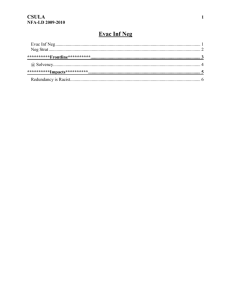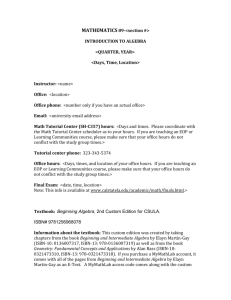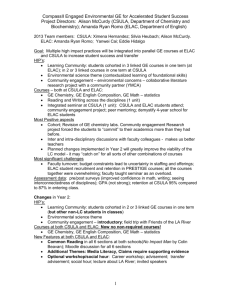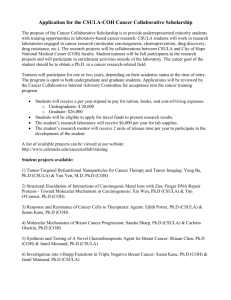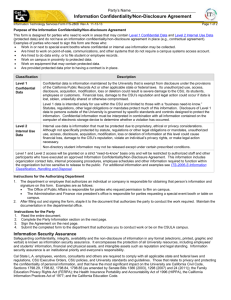Biz Con - SoCal
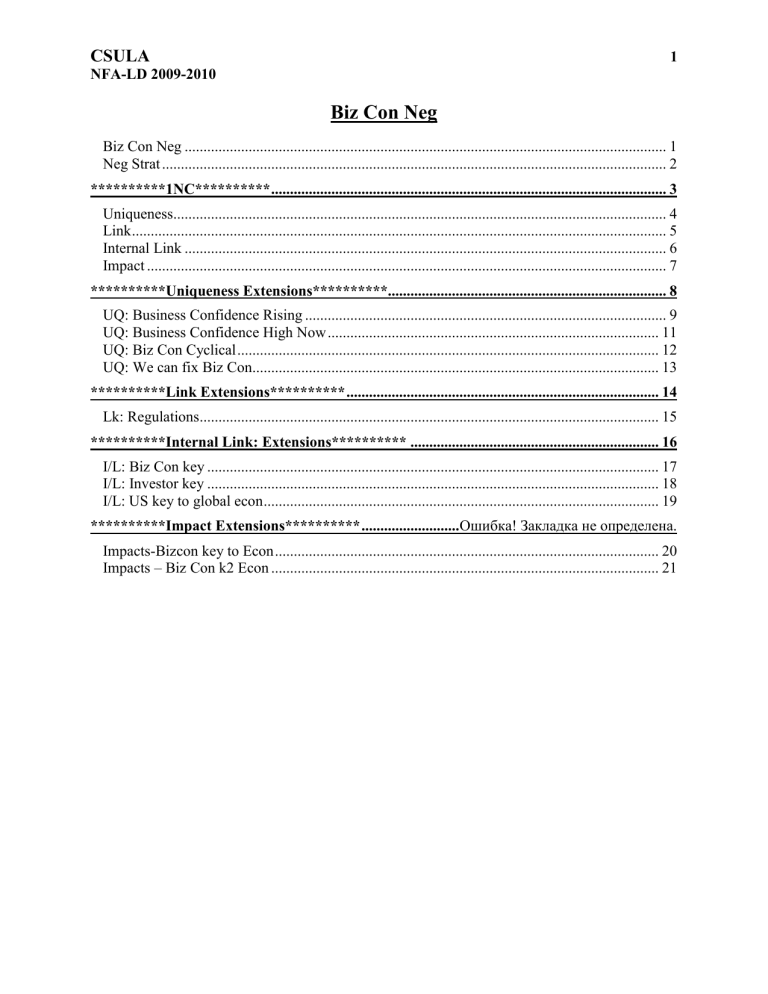
CSULA
NFA-LD 2009-2010
1
Biz Con Neg
**********Impact Extensions********** ..........................
Ошибка! Закладка не определена.
CSULA
NFA-LD 2009-2010
2
Neg Strat
This is your standard Business Confidence DA. Nothing amazing here except for the impact, but we will get there soon enough.
UQ : Biz con is High/Rising now
LK : Plan hurts biz con
I/L : Biz Con k2 econ
I : Econ k2 food prices, kills billions
Winning biz con rising shouldn’t be too hard. Winning that their plan hurts biz con is a bit harder.
CSULA
NFA-LD 2009-2010
**********1NC**********
3
CSULA
NFA-LD 2009-2010
Uniqueness
Business Confidence is fragile but on the rise!
New York Times September 26, 2009
[Saturday Late Edition - Final New Signs That Recovery May Come in Dribs and
Drabs JACK HEALY SECTION: Section B; Column 0; Business/Financial Desk; LN. MJS]
New figures
on home sales and manufacturing activity suggested on Friday that
economic recovery was likely to occur in fits and starts
because of high unemployment, a mercurial stock market and shaky consumer demand. ''It's not going to be smooth,'' said Bernard Baumohl, managing director of the Economic Outlook Group, who is expecting a strong rebound. ''We will be moving three steps forward and one step back. But on the whole, I expect this recovery's going to be moving upward.''
Reports on Friday showed that consumer sentiment rose this week to its highest levels since the start of 2008
and that new-home sales edged up for a fifth consecutive month, but other barometers of the economy revealed uncertainties
. Orders for goods like airplanes and machinery fell unexpectedly in August, the government reported
on Friday, showing that the manufacturing sector was still fragile
. New orders for durable goods slid by a seasonally adjusted 2.4 percent from July, reflecting a 40 percent monthly decrease in orders of civilian aircraft. Orders for computers, electrical equipment and transportation equipment all fell, and shipments of all durable goods slipped 1.4 percent for the month. Over all, orders for durable goods were down 25 percent from a year earlier. But excluding the transportation sector, durable goods orders were flat in August. Still, the report was the second signal of economic weakness in two days, and fell short of economists' forecasts for a gain of 0.4 percent. On Thursday, a real estate industry group reported that sales of previously owned homes -- which dominate the housing market -- fell in August after several months of gains. Although Friday's report on new-home sales showed a gain, it was less than economists had expected. ''We expect a very sluggish recovery,'' said Cliff Waldman, an economist at the Manufacturers Alliance/MAPI. ''It's more than just a downturn. You had a collapse in the housing market, and a near collapse in the financial system.'' Factories and industrial
businesses have gradually
been ramping up production and hiring part-time workers in some areas as they begin rebuilding their depleted inventories.
Most
economists say they
believe the economy has now technically pulled out of recession, and are expecting businesses to expand in the second half of the year
. Still, that recovery is likely to be jagged, marked by high unemployment and questions about whether consumer or business spending will bounce back or remain subdued. The Commerce Department reported on Friday that sales of new homes rose 0.7 percent in August, hitting their highest level in almost a year. Sales rose to a seasonally adjusted annual rate of
429,000, largely because home sales increased the West. The median price of a new home fell to $195,200, from $215,600 a month earlier. Meanwhile, a Reuters-University of Michigan survey showed that consumer sentiment rose in September as consumers said they were growing more optimistic about the economy's progress and the employment picture heading forward. The index of sentiment rose to 73.5, from 65.7 in August.
4
CSULA
NFA-LD 2009-2010
Link
Regulation hinders investment and growth
Tobias
Madden ,
Regional Economist FedGazette, Fed Reserve Bank of Minneapolis, Jan
.
‘08
“ Mixed bag for 2008”, http://www.minneapolisfed.org/pubs/fedgaz/08-01/poll.cfm
The biggest challenges facing businesses are
securing workers and complying with government regulation.
“We have been in such an incredibly tight labor market,” a Montana manufacturer said. Over half of all respondents expect a challenging time finding workers. Leaders from the agricultural and retail sectors have the hardest time securing workers. About three-quarters of the Dakota respondents expect finding workers as a challenge or a serious challenge, compared with only 23 percent of the respondents from the U.P. About half of all respondents see government regulation as a challenge.
The respondents from the finance, insurance and real estate sector expect the toughest government regulation.
“Regulation by state and national government will hamper investment and growth seriously,”
said a financial services respondent from the U.P.
5
CSULA
NFA-LD 2009-2010
Internal Link
Lack of business confidence destroys the economy
John
Braithwaite , Australian Research Council Federation fellow, 2004 ,
The Annals of The
American Academy of Political and Social Science, March, “Emancipation and Hope,” Lexis
The challenge of designing institutions that simultaneously engender emanci- pation and hope is addressed within the assumption of economic institutions that are fundamentally capitalist. This contemporary global context gives more force to the hope nexus because we know capitalism thrives on hope.
When business confidence collapses, capitalist economies head for recession.
This dependence on hope is of quite general import; business leaders must have hope for the future before they will build new factories; consumers need confidence before they will buy what the factories make; investors need confidence before they will buy shares in the company that builds the factory; bankers need confidence to lend money to build the factory; scientists need confidence to innovate with new technologies in the hope that a capitalist will come along and market their invention . Keynes’s ([1936]1981)
General Theory of Employment, Interest and Money lamented the theoretical neglect of “animal spirits” of hope (“spontaneous optimism rather than . . . mathematical expectation” (p. 161) in the discipline of economics, a neglect that continues to this day (see also
Barbalet 1993).
6
CSULA
NFA-LD 2009-2010
Impact
Economic collapse exacerbates global food crisis
Cha and McCrummen ’08 Cha, Graduate of Columbia and John Hopkin’s School of Advanced International Studies, and
McCrummen, Washington Post Writer, 08 Ariana Eunjung Cha and Stephanie McCrummen, 10-26-08, “Washington Post, Financial Meltdown
Worsens Food Crisis; As Global Prices Soar, More People Go Hungry,” Lexis
Muchiri said nearly everyone
he knows is cutting back on planting, which means even less food for a continent where the supply has already been weakened by drought, political unrest and rising prices.
While the world's attention has been focused on rescuing investment banks and stock markets from collapse , the global food crisis has worsened, a casualty of the growing financial tumult.
Oxfam, the Britain-based aid group, estimates that economic chaos this year has pulled the incomes of an additional 119 million people below the poverty line. Richer countries from the United States to the Persian Gulf are busy helping themselves and have been slow to lend a hand. The contrast between the rapid-fire reaction by Western authorities to the financial crisis and their comparatively modest response to soaring food prices earlier this year has triggered anger among aid and farming groups. "
The amount of money used for the bailouts
in the U.S. and Europe -- people here are saying that money is enough to feed the poor in Africa for the next three years
," said Muchiri, head of the Eastern Africa Farmers Federation. The U.N. Food and Agriculture Organization estimates that 923 million people were seriously undernourished in 2007. Its director-general, Jacques Diouf, said in a recent speech that he worries about cuts in aid to agriculture in developing countries. He said he is also concerned by protectionist trade measures intended to counteract the financial turmoil. Although the price of commodities has come down in the past few months, Diouf said, 36 countries still need emergency assistance for food, and he warned of a looming disaster next year if countries do not make food security a top priority. "
The global financial crisis should not make us forget the food crisis,
" Diouf said. Commodity prices have plummeted in recent weeks as investors have shown increasing concern about a global recession and a drop in the demand for goods. Wheat futures for December delivery closed at $5.1625 on Friday -- down 62 percent from a record set in February. Corn futures are down 53 percent from their all-time high, and soybean futures are 47 percent lower. Such declines, while initially welcomed by consumers, could eventually increase deflationary pressures -- lower prices could mean less incentive for farmers to cultivate crops. That, in turn, could exacerbate the global food shortage
. In June, governments, donors and agencies gathered in Rome to pledge $12.3 billion to address the world's worst food crisis in a generation. But only $1 billion has been disbursed. An additional $1.3 billion, which had been earmarked by the European Commission for helping African farmers, is tied up in bureaucracy, with some governments now arguing that they can no longer afford to give up that money. "
The financial crisis is providing an excuse for people across the spectrum -- governments, multilateral organizations, companies -- to not do the right thing ," said Oxfam spokeswoman Amy Barry.
Even small food price increases kill half the planet.
Brown ’05
Lester Brown, President of Earth Policy Institute, MPA at Harvard, Former Advisor to the Secretary of Agriculture, 2005.
“Outgrowing The Earth,” http://www.earth-policy.org/Books/Out/.
“Many Americans see terrorism as the principal threat to security,” said Brown, “but for much of humanity, the effect of water shortages and rising temperatures on food security are far more important issues. For the 3 billion people who live on 2 dollars a day or less and who spend up to 70 percent of their income on food, even a modest rise in food prices can quickly become life-threatening . For them, it is the next meal that is the overriding concern.”
7
CSULA
NFA-LD 2009-2010
**********Uniqueness Extensions**********
8
CSULA
NFA-LD 2009-2010
UQ: Business Confidence Rising
Business Confidence Rising Now
NZ 6/30/09 (hearld New Zealind Hearld “Business confidence keeps rising, builders most optimistic.” Jun 30, 2009 http://www.nzherald.co.nz/business/news/article.cfm?c_id=3&objectid=10581625)
We have travelled the country to learn how people are coping with the recession.
Watch the video interviews, or send us your own videos and tips, at nzherald.co.nz/go/surviving09 T he latest Business Outlook survey from the National Bank contains more good news for those hoping the worst of the recession is over, with a net 6 per cent expecting business conditions to improve over the next 12 months. This is up 4 percentage points from the last survey held in
May. The construction industry is particularly optimistic, with a net 46 per cent expecting better times ahead, the highest reading in ten years. A net 8 per cent of firms expect better times ahead for their own businesses. Improving sentiment was apparent in all the major sub-groups, apart from services
. "These movements are welcome. But, like last month, the dog still has fleas. Profit, employment and investment intentions remain very weak, barely budging on the month prior," said National Bank chief economist Cameron Bagrie. The labour market outlook had remained particularly poor with a net 17 per cent expecting to hire fewer staff in the year ahead, down 1 percentage point on May.
US Business Confidence Rising now
Stella 7/7/09 (Stella Mapenzauswa “Stable markets boost business confidence” July 7, 2009 http://www.busrep.co.za/index.php?fArticleId=5069940&fSectionId=561&fSetId=662)
U.S. business confidence rose last month, helped by economic data and financial market movements suggesting stabilisation, although recovery was tentative, a survey showed yesterday. Business confidence has taken a knock over the past year, as depressed local and global demand for domestic products has slashed mining and manufacturing output. The business confidence index increased to 83.1 points last month from 81.8 in May
, lifting the average for the second quarter to 82.3 compared with 81.9 in the first quarter, the SA
Chamber of Commerce and Industry (Sacci) said yesterday. "
Although still broadly depressed, a number of economic indicators suggest that the decline of the economy has bottomed out and that some economic activities may even have turned
," Sacci said. However, the demand for local goods and services remained strained. South Africa fell into recession in the first quarter when gross domestic product shrank at a 6.4 percent annual pace after a 1.8 percent contraction in the fourth quarter of last year.
9
CSULA
NFA-LD 2009-2010
Consumer sentiment rising
Kelly Evans. Wall Street Journal. “U.S. News: Americans Are Saving More, Amid Rising
Confidence” 2009.
10
Still, consumer sentiment rose for the fifth month in a row in June, a separate report
Friday showed, to its highest level since February 2008.
The consumer sentiment index, produced by
Reuters and the University of Michigan, rose to 70.8 in June from 68.7 in May, though it remains well below its peak of 96.9 in January
2007. The personal saving rate jumped to 6.9% in May, the Commerce Department said Friday, compared to 5.6% in April. The gain was partly attributable to one-time government payments to eligible seniors made under the Obama administration's economic-stimulus plan intended to spur consumer spending. But recipients seem unwilling to spend right away. Though the payments helped boost personal income by 1.4% in May, consumer spending -- the main driver of U.S. economic growth -- rose just 0.3% from the prior month. "The government is doing its job of adding stimulus to the economy in the short run," said Wachovia Corp. chief economist
John Lonski. But he said it is not yet clear the plan is having the desired multiplier effect. Some think the high saving rate will keep a lid on consumer spending and a broader recovery. But for now, the outlook for U.S. growth this year is improving. Friday's reports cap a week that also showed improvement in business spending last month and a smaller drop in first-quarter economic growth than previously thought.
Many economists now expect the recession, which began in December 2007, to end in the third quarter of this year. There are several obstacles weighing on prospects for a quick recovery. Households are facing the weakest labor market in decades, as the U.S. unemployment rate -- 9.4% as of May -- is likely to march higher when June data are released next Thursday.
Roughly 6.7 million workers are drawing weekly unemployment benefits. "We still expect a subdued recovery," said economists at
Barclays Capital in a note Friday.
CSULA
NFA-LD 2009-2010
UQ: Business Confidence High Now
Small business confidence high now
BMA.com 6/30 09 (Better Money Advice.com‘Small Business Confidence Remains High” June 30 2009. http://www.financedaily.co.uk/showNews.aspx?loadid=001159)
T he majority of business owners are forecasting rough times ahead for others but not for themselves.
According to the doom-mongers it's simple:
We are in the midst of a credit crisis, heading for a recession with job losses and repossessions on the horizon. However a major survey of business confidence shows the real picture is far more complex.
The
Chartered Institute of Management Accountants (CIMA) releases its first Quarterly Economic Survey today which conveys the opinions of 200 finance directors across the country in manufacturing, retail and financial services as well as the public sector.
The majority are buoyant about their own business fortunes. Half the companies report that sales have grown in the past quarter and 62 per cent of firms are forecasting sales growth in the next four months
. But despite this almost half of FDs thought the credit crunch is likely to provoke a full-blown recession. Only 15% thought a recession unlikely
. Confidence in the job market is also mixed - 4 in 5 businesses say they don't anticipate any job losses this year
. However those
20% of firms that did expect cost cutting measures forecast that temporary and agency staff would be the first to go and less money spent on outsourcing services. And the job squeeze is forecast to be felt in graduate recruitment with over half of companies saying they will not be looking to take on any graduates over the next year making the next few months a tense time for final year university students seeking their first rung on the career ladder
11
CSULA
NFA-LD 2009-2010
UQ: Biz Con Cyclical
Although business confidence is decreasing, it fluctuates in a cycle meaning it will eventually be restored
The Business Report, “Drop in business confidence part of a cycle”, July 8th, 2008 http://www.fastmoving.co.za/news-archive/sa-economy/drop-in-business-confidence-part-of-a-cycle
The world economic market overall is uncertain at this stage, but all cycles - good and bad - come to an end .
"But
I think that the country's macro-economic policies remain strong and despite a number of external global factors - like the much-publicized subprime mortgage crisis and credit crunch faced by many countries - we should be heading for less choppy waters as we approach the third and fourth quarters of next year,
" added Mokoena. "Also, as we head towards the 2010 soccer World Cup I believe a more positive business sentiment will start emerging. Consumers and companies just need to fine-tune their current business strategies and ensure they are well placed to weather the storm.
Those companies that plan for the business upturn now are the ones that are really going to shine.”
12
CSULA
NFA-LD 2009-2010
UQ: We can fix Biz Con
Business confidence is strengthening now, but government action can reverse the positive gains
Wilkinson.
7/7 /
09 (Stephen Wilkinson. Ashdown Financial Group “Government 'must nurture business confidence'” 7/7/09. http://www.ashdowngroup.com/news/government-must-nurture-business-confidence--news-19254247)
The government needs to ensure that red tape and taxation does not stifle a recovery in the employment market
, as it has been claimed.
Most key performance indicators in the manufacturing and service sectors improved during the second quarter of this year.
It also found that there has been a strengthening in confidence.
However,
David Frost
, director-general of the BCC, warned that a recovery is not guaranteed and urged the government to ensure it nurtures these green shoots. He said: "The government needs to think long and hard about its policies on taxation and red tape, which threaten to stifle growth and employment. "The planned increase in National
Insurance contributions is nothing more than a tax on jobs and it should be abandoned immediately before it begins to hurt the confidence of investors."
Recently,
Recruiter magazine reported that James Caan, entrepreneur and TV star, is encouraging firms to hire staff now. Speaking to charities at an event in London, he explained that businesses will have access to talented people out of work during the downturn, but warned that they will soon be snapped up.
13
CSULA
NFA-LD 2009-2010
**********Link Extensions**********
14
CSULA
NFA-LD 2009-2010
15
Lk: Regulations
Regulation decreases business investment and investor confidence and kills competitiveness
Susan
Lee writing for Consumers’ Research Magazine, Aug.
19
96 , “How Government Menaces Our Economic Health”, vol. 79 no. 8, pp.
16-17
Who Pays for All This? In general, the cost of regulating is
initially expressed as a cost of doing business.
Okay, but who pays this tariff? We all do, in one way or another. Consider a standard situation in which a law requires certain practices to be followed in hiring or procedures to be used to assure product quality. The former will raise costs by forcing employers to expand their job search and fill out forms to prove comp1ianc the latter will raise costs by requiring changes in the production process.
Sometimes, firms can pass these costs to consumers, making them pay more; sometimes, firms can’t pass them along at all, so they will have lower profits, which means that owners or shareholders foot the bill.
But, often, employers pass these costs down the line with lower wages and salaries. Other times, when costs cannot be directly passed off to employees, employers will respond by either hiring fewer people or laying off those already employed. Either way, higher business costs from regulation will result in lower wages and/or higher unemployment.
Excessive regulation also discourages investment in domestic business: Why plop a factory down on regulated soil when unregulated opportunities beckon abroad?
Moreover, the threat of regulatory changes creates uncertainty, which scares investors, who then demand higher returns, and tends to make planning horizons more short term. Further, regulation stymies innovation.
This has been especially true in the drug ind medical- device industry. Long approval periods shorten the effective patent time for the results of expensive research and development and thus diminish returns on discoveries without lowering risk.
A larger gap between risk and return renders many research and development projects too unprofitable to undertake. And last, all of the above make it harder for domestic firms to compete in international markets in which many foreign-based firms do not have to contend with the effects of excessive regulation.
Taxes and regulations tank business confidence, decreasing investment
ICAEW
(Institute of Chartered Accountants in England & Wales), 5-9-
08 , “Business confidence still fragile says ICAEW/Orange UK survey”, http://www.icaew.com/index.cfm?route=135719
The latest ICAEW- Orange UK Business Confidence Monitor shows that while forecasts for GDP and profit growth have increased this quarter, almost half of the finance professionals
surveyed are worried about the growing burdens of tax and regulation, leading them to invest less in the economy and so endanger long term prospects for economic growth.
Despite rising profit forecasts for the fourth quarter in a row (6.3 per cent), firms in the UK predict that they will increase their capital investment budgets at a lower rate than they did over the past year, from 3.0 per cent last year, down to 2.2 per cent over the coming 12 months.
This suggests that businesses are not as confident about investing
capital in the UK. Eric Anstee, Chief Executive of the ICAEW, said: “While the BCM shows the economy is moving in the right direction, the longer term economic outlook looks fragile.
A lack of business investment could play an important role in weakening economic growth further down the road, especially if world economic imbalances start to unravel.
I would urge the Government to revisit its taxation and regulatory regimes to renew confidence among businesses of all sizes which, despite higher profit growth expectations and rising confidence, remain nervous of further investment.”
CSULA
NFA-LD 2009-2010
**********Internal Link: Extensions**********
16
CSULA
NFA-LD 2009-2010
I/L: Biz Con key
Business confidence key to econ
Kirchhoff and Hegenbaugh 09 (“What's worrying business? Confidence erodes across industries” Sue Kirchhoff and Barbara
Hegenbaugh, USA TODAY http://www.usatoday.com/educate/college/careers/news12.htm 2009)
Business investment and hiring are key to sustained economic growth, as consumer spending growth slows from its heady pace. While corporate profits and spending have ramped up, economists are nervous about one key element -- confidence.
Business confidence has eroded since spring, according to several surveys. On Monday, economic consulting firm Economy.com said its weekly survey of business owners showed declines were widespread, both geographically and across industries. The U.S. index is off 25% from its peak earlier this summer.
How business executives see the world is key for the economy because it can influence decisions on hiring and investing.
Nervousness is likely one reason hiring has been patchy this year, spiking in March but growing less rapidly since then.
The collapse of business confidence would cause recession – dependence on it is a gamble
Brathwaite in 2004
(John is an Australian Research Council Federation fellow at Australian National University, and chair of the
Regulatory Institutions Network, March 2004, The Annals of The American Academy of Political and Social Science, 592 Annals 79,
“Emancipation and Hope”, JSTOR)
The challenge of designing institutions that simultaneously engender emancipation and hope is addressed within the assumption of economic institutions that are fundamentally capitalist. This contemporary global context gives more force to the hope nexus because we know capitalism thrives on hope.
When business confidence collap ses, capitalist economies head for recession.
This dependence on hope is of quite general import; business leaders must have hope for the future before they will build new factories; consumers need confidence before they will buy what the factories make; investors need confidence before they will buy shares in the company that builds the factory
; bankers need confidence to lend money to build the factory; scientists need confidence to innovate with new technologies in the hope that a capitalist will come along and market their invention. Keynes's ([1936]1981) General Theory of Employment,
Interest and Money lamented the theoretical neglect of "animal spirits" of hope ("spontaneous optimism rather than . . . mathematical expectation" (p. 161) in the discipline of economics, a neglect that continues to this day (see also Barbalet 1993).
17
CSULA
NFA-LD 2009-2010
I/L: Investor key
Investor confidence is key to the US economy.
PR Newswire – 8/6
/
02 edition. “American Stock Exchange Chairman Salvatore Sodano Addresses Seventh Oil And Gas Conference” http://www.prnewswire.com/
"Wall Street and Congress have already begun to respond to the growing crisis of confidence, including the Amex," said Mr. Sodano.
"It is critical that we restore investor confidence in the markets
. The Amex has established a framework for the development of new corporate governance rules. It is our goal to establish rules that ensure accountability, transparency and oversight while also recognizing the importance of diversity and critical needs of companies at different stages of development." "
The global economy is changing rapidly and it is increasingly more important that the rules governing our nation' s capital markets are on a competitive and level playing field with the rest of the world. We live in an age of delicate economic equilibrium.
Bound together in a global economy -- every action we take can result in reverberations in the far corners of the earth.
As a nation, we need to accelerate our efforts to reach agreement on a set of common global accounting standards.
Restoring investor confidence is paramount," concluded Mr. Soda
18
CSULA
NFA-LD 2009-2010
19
I/L: US key to global econ
The US economy has important effects on the international economy.
Board of Governors of the Federal Reserve System ,
20
05
(The Federal Reserve System: Purposes and Functions, pg. 51)
The U.S. economy and the world economy are linked
in many ways.
Economic developments in this country have a major influence on production, employment, and prices beyond our borders
; at the same time, developments abroad significantly affect our economy. The U.S. dollar, which is the currency most used in international transactions, constitutes more than half of other countries’ official foreign exchange reserves
. U.S. banks abroad
and foreign banks in the United
States are important actors in international financial markets
.
The activities of the Federal Reserve and the international economy influence each other
. Therefore, when deciding on the appropriate monetary policy for achieving basic economic goals, the Board of Governors and the FOMC consider the record of U.S. international transactions, movements in foreign exchange rates, and other international economic developments. And in the area of bank supervision and regulation, innovations in international banking require continual assessments of, and occasional modifications in, the Federal Reserve’s procedures and regulations.
The Federal Reserve formulates policies that shape
, and are shaped by, international developments
.
It also participates directly in international affairs
. For example, the Federal Reserve occasionally undertakes foreign exchange transactions aimed at influencing the value of the dollar in relation to foreign currencies, primarily with the goal of stabilizing disorderly market conditions. These transactions are undertaken in close and continuous consultation and cooperation with the U.S. Treasury. The Federal Reserve also works with the Treasury and other government agencies on various aspects of international financial policy.
It participates in a number of international organizations and forums and is in almost continuous contact with other central banks on subjects of mutual concern.
The US economy affects inflation and economic growth abroad .
Board of Governors of the Federal Reserve System ,
20
05
(The Federal Reserve System: Purposes and Functions, pg. 52-53)
The Federal Reserve’s actions
to adjust U.S. monetary policy are designed to attain basic objectives for the U.S. economy. But any policy move also inf luence s, and is inf luenced by
, international developments
. For example, monetary policy actions inf luence exchange rates. The dollar’s exchange value in terms of other currencies is therefore one of the channels through which U.S. monetary policy affects the U.S. economy. If Federal Reserve actions raised U.S. interest rates, for instance, the foreign exchange value of the dollar generally would rise.
An increase in the foreign exchange value of the dollar
, in turn, would raise the price
in foreign currency of
U.S. goods traded on world markets and lower the dollar price of goods imported into the United States
. By restraining exports and boosting imports, these developments could lower output and price levels in the economy. In contrast, an increase in interest rates in a foreign country could raise worldwide demand for assets denominated in that country’s currency and thereby reduce the dollar’s value in terms of that currency. Other things being equal, U.S. output and price levels would tend to increase—just the opposite of what happens when U.S. interest rates rise. Therefore, when formulating monetary policy, the Board of Governors and the
FOMC draw upon information about and analysis of international as well as U.S. domestic inf luences. Changes in public policies or in economic conditions abroad and movements in international variables that affect the U.S. economy, such as exchange rates, must be factored into the determination of U.S. monetary policy. Conversely, economic developments in the United
States, including U.S. monetary policy actions, have significant effects on growth and inf lation in foreign economies . Although the Federal Reserve’s policy objectives are limited to economic outcomes in the United States
, it is
mutually beneficial for
macroeconomic and financial policy makers in the United
States and other countries to maintain a continuous dialogue. This dialogue enables the Federal Reserve to better understand and anticipate inf luences on the U.S. economy that emanate from abroad
. The increasing complexity of global financial markets—combined with everincreasing linkages between national markets through trade, finance, and direct investment—have led to a proliferation of forums in which policy makers from different countries can meet and discuss topics of mutual interest.
CSULA
NFA-LD 2009-2010
20
Bizcon key to Econ
Bizcon is key to prevent economic collapse resulting from a lack of investment
Thomas Boston, Black Enterprise, Jan 2003 “Confidence is key: economist cites the importance of business outlook to recovery - The Economy & You”, http://findarticles.com/p/articles/mi_m1365/is_6_33/ai_95845058,
Trying to jump-start the economy by reducing interest rates
even further is like pushing on a string
. Despite the fact that the Federal Reserve has lowered the federal funds rate to 1.75%, its lowest level in 40 years, the
Index of Leading Economic Indicators (the measure used to gauge the future health of the economy) has declined for four consecutive months. Why is the economy so anemic? One major reason is declining consumer and business confidence.
Think of it this way: Suppose you decide to make a major purchase, such as a house or automobile. If the price has been determined, two additional factors are likely to figure prominently in your decision to make the purchase. The first factor is the interest rate, which is nothing more than the cost of borrowing money.
The second factor is how confident you are about your future earnings.
For example, if you are concerned about job security, you are not likely to make the purchase, no matter how low interest rates might be. The same logic holds for business owners deciding whether to undertake a new investment
. While interest rates are important because they affect the total return on capital invested, if business owners are pessimistic about future economic activity, even low interest rates will not be attractive enough to make them invest.
Biz con key to the economy – investment and employment
Thomas D.
Boston , heads Boston Research Group in Atlanta & member of the Black Enterprise Board of Economists, 1-1-
03 , “Confidence is key: economist cites the importance of business outlook to recovery”,
Think of it this way: Suppose you decide to make a major purchase, such as a house or automobile. If the price has been determined, two additional factors are likely to figure prominently in your decision to make the purchase. The first factor is the interest rate, which is nothing more than the cost of borrowing money. The second factor is how confident you are about your future earnings. For example, if you are concerned about job security, you are not likely to make the purchase, no matter how low interest rates might be. The same logic holds for business owners deciding whether to undertake a new investment. While interest rates are important because they affect the total return on capital invested, if business owners are pessimistic about future economic activity, even low interest rates will not be attractive enough to make them invest. Over the past year, business owners have been more wary than consumers, so investments have lagged.
Fortunately, consumer spending has carried the economy forward
--even though consumers are facing record levels of debt. But the situation has changed over the last three months.
The growing number of job losses has caused consumers to become cautious. As a result, if the economy is to improve, investment must pick up.
But low interest rates alone will not get the job done. Rather, the key index to watch is business confidence.
The Gazelle Index, a survey of 350 of the nation's fastest growing black-owned businesses as measured by workforce growth rates, took a sharp drop, from 67.7 to 49.5, between the second and third quarters. An index value below 50 indicates that business owners are more negative than positive about economic conditions.
Why is the index value important?
When business leaders are concerned about the economy, they reduce hiring, which contributes to higher unemployment rates.
CSULA
NFA-LD 2009-2010
21
Impacts – Biz Con k2 Econ
Business investment is the dominant factor – biz con dictates the direction of the economy
Investopedia ,
Forbes Media Company,
’08
, “Consumer Confidence: A Killer Statistic”, http://www.investopedia.com/articles/fundamental/103002.asp
Though not as powerful an indicator as consumer spending, business capital spending can be a killer statistic - since things can get ugly in a hurry when overall business investment precipitously cuts back: the impact on the economy can be felt at an even faster pace than as if the cut occurred purely along consumer lines.
The rationale is that today's sophisticated and large inventory-lean corporations often can gauge future demand before policy makers can implement changes, which often take months to kick in due to embedded policy lags. Corporate spending is therefore very similar today to the role the stock market has played in most recoveries: improvements can be foreseen as a leading indicator for things to come.
On the flip-side, cutbacks in corporate capital spending are indeed an ominous indicator. The PMI, or Purchasing Managers Index, is a representation of the progress in corporate spending.
Confidence is key to prevent economic collapse
Braithwaite ’04
(John, Australian Research Council Federation fellow, Australian National University, and is the chair of the
Regulatory Institutions Network; “Emancipation and Hope” March, 592 Annals 79 ln)
The challenge of designing institutions that simultaneously engender emancipation and hope is addressed within the assumption of economic institutions that are fundamentally capitalist. This contemporary global context gives more force to the hope nexus because we know capitalism thrives on hope.
When business confidence collapses, capitalist economies head for recession
. This dependence on hope is of quite general import; business leaders must have hope for the future before they will build new factories; consumers need confidence before they will buy what the factories make; investors need confidence before they will buy shares in the company that builds the factory; bankers need confidence to lend money to build the factory; scientists need confidence to innovate with new technologies in the hope that a capitalist will come along and market their invention
. Keynes's ([1936]1981) General Theory of Employment, Interest and Money lamented the theoretical neglect of "animal spirits" of hope ("spontaneous optimism rather than . . . mathematical expectation" (p. 161) in the discipline of economics, a neglect that continues to this day (see also Barbalet 1993).
CSULA
NFA-LD 2009-2010
22
